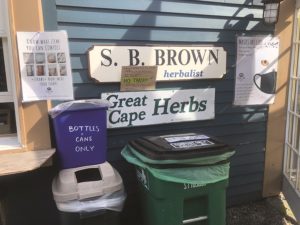Someone walks out of Snowy Owl Coffee Roasters in Brewster with a disposable cup of iced coffee, passing the compost bins, garden beds, and clucking chickens. Luckily, that cup is compostable. But the customer gets in a car and drives away, finishing her coffee on the go. Unless she happens to be headed to an off-Cape town with an industrial composting facility, the cup will most likely end up in a landfill.
Cape Codders interested in composting outside of their own back yards have few choices. The options are even fewer for restaurants and other businesses with larger volumes of food scraps and items like compostable forks, cups, and napkins.
The Mass. commercial organic waste ban was enacted in 2014 in an effort to divert food scraps from the trash. The ban prohibits restaurants and businesses that generate more than one ton of food waste per week from disposing of it in the waste stream, mandating that it be channeled into composting, conversion, or recycling.
The ban, however, was an “unfunded mandate,” said Amy Alati, a hazardous materials specialist with the Barnstable County Dept. of Health and Environment. Alati got involved in forming the Cape Cod Composting Network, which focused on composting food waste. But after two years, job changes and a lack of funding caused the network to disband.

Alati doesn’t know of many centralized options for composting. The county’s health and environment website lists a number of composters, but most of them are off-Cape. That means that private citizens or businesses wishing to compost must either drive their waste several hours away or pay a company to do it for them.
Black Earth Compost, based in Gloucester, has clients as far down the Cape as Orleans — Snowy Owl is one. They are in discussions with several towns, but there aren’t yet any concrete plans, said Connor Miller, one of the owners.
“There’s a waste problem in Massachusetts,” said Miller. “All the landfills are closing by 2030.”
Food makes up about a third of landfill waste, so increasing composting is becoming a higher priority. In addition, composting has many environmental benefits: compost in the soil pulls carbon dioxide out of the air, which regulates temperature and increases plant growth.
The transfer stations in Eastham, Wellfleet, and Truro accept residents’ food scraps to compost. When the compost is fully broken down, some of the transfer stations send it to be used on local farms.
Cape Cod zoning laws aren’t conducive to establishing composting processing, said Alati. That’s because larger-scale composting has a NIMBY problem — “not in my back yard,” she said. People want to compost but worry it will smell or that it will attract animals.
A few businesses have taken composting into their own hands. Tracy Barry-Hunt, owner of Winslow’s Tavern in Wellfleet, said her restaurant composts all kitchen waste. She purchased six Swedish Jora composters because she couldn’t find a real municipal compost option anywhere on the Cape, she said.
Laura Ludwig of the Center for Coastal Studies in Provincetown said it has been composting kitchen scraps since 2012. Ludwig is the coordinator of the Marine Debris and Plastics Program, but her knowledge of composting came through her efforts as a private citizen.
The further down Cape you go, the harder it is to find composting services. “Composting is very market driven,” said Alati, and while there are companies that do cart food waste away, they have to be able to make a profit, and the time and cost to drive to the Outer Cape can cut into that.
Ludwig recalls a time people from different Outer Cape towns met to explore setting up an industrial compost facility here. The group found no good way to do that in Provincetown.
Still, Ludwig remains committed to the idea. “In terms of climate change impacts,” she said, “composting is one of the best things you can do.”
